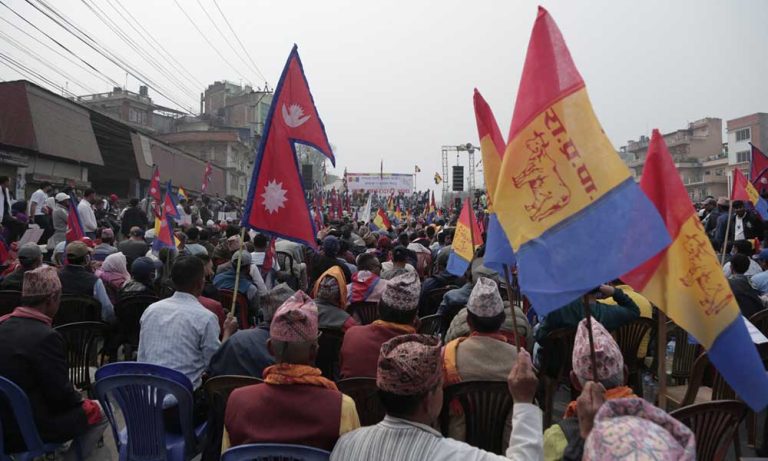Rastriya Prajatantra Party (RPP) Chairperson Rajendra Lingden has called for a political system that respects all parties and citizens, without exclusion or disrespect. Speaking at a mass gathering held in Balkhu, Kathmandu, on Tuesday, Lingden said his party’s ongoing movement aims to create a political environment where all responsible forces in the country can find space and recognition.
The RPP had planned to hold the event at Bhrikutimandap. However, authorities denied permission, prompting party leaders and supporters to move the program to Balkhu instead. Lingden criticized the government’s decision and reiterated demands for the immediate release of party members arrested during a recent demonstration on March 28.
“We Want a System That Unites, Not Divides”: Lingden
Chair Lingden stressed that Nepal needs a system that does not humiliate or exclude any section of society. “We are not against democracy,” he said, “but we want a version that is truly inclusive, where traditional values are respected, and where no one feels insulted.”
Lingden has long advocated for constitutional monarchy and Hindu statehood — two key pillars of RPP’s ideology. However, he emphasized that the current campaign is not aimed at attacking any party or person but at rebuilding mutual respect and national unity.
Protesters Detained, RPP Demands Their Release
Tensions have been building between RPP and law enforcement since March 28, when several party members were arrested during a protest rally in Kathmandu. The party maintains that the protest was peaceful and within their constitutional rights.
“The government talks about freedom but is afraid of peaceful protests,” said RPP Senior Vice President Buddhiman Tamang during the Balkhu event. He demanded that the state uphold the right to free expression and peaceful assembly.
According to police, the arrests were made to prevent potential disruption of public order. However, RPP leaders argue that the detentions were politically motivated.
Accusations Against Major Political Parties
The RPP has openly criticized the ruling and opposition parties for what it calls a failure in governance and economic mismanagement.
Dr. Prakash Chandra Lohani, Chair of the RPP Steering Committee and a senior economist, accused Nepal’s “so-called major parties” of driving the economy to ruin. “The people will judge their actions,” he said, urging the public to demand accountability from all political leaders.
He added that political instability, corruption, and lack of vision have severely weakened national institutions.
Rana Reminds Parties of Past Agreements
Also speaking at the rally, former RPP Chair Pashupati Shumsher JB Rana recalled past commitments made to the former monarchy. He said that today’s political leaders have ignored the agreements that helped Nepal transition from monarchy to federal democracy.
“There was a mutual understanding that the traditions and contributions of the monarchy would not be erased,” Rana stated. “But successive governments have broken that promise.”
Rana argued that this betrayal has contributed to ongoing political division and national identity confusion.
RPP’s Growing Influence in National Politics
While the RPP holds a relatively small number of seats in the federal parliament, the party has been gaining attention due to its strong grassroots support and clear ideological stance. The party promotes a return to a Hindu state and supports reinstating constitutional monarchy — ideas that still resonate with a portion of Nepal’s population.
Analysts say the RPP’s message appeals to citizens frustrated with the current political climate, especially amid growing economic concerns and perceived government inaction.
In the 2022 general elections, RPP secured 14 seats, making it a rising force in conservative politics.
Peaceful Assembly and Freedom of Expression Under Scrutiny
The recent events have once again raised concerns about civil liberties in Nepal. Human rights groups and civil society members have warned against excessive use of force by authorities to suppress peaceful protests.
Article 17 of Nepal’s Constitution guarantees citizens the right to peaceful assembly and expression. Still, parties like the RPP claim these rights are often denied when the ruling establishment feels threatened.
Lingden, while addressing the crowd, urged the government to stop using force against citizens who voice different opinions. “We may not agree with others, but we must allow everyone to speak,” he said.
What’s Next for RPP?
The RPP has announced more protest events across major cities in the coming weeks. It plans to continue its campaign demanding a political system that includes traditional values, cultural identity, and broader national unity.


